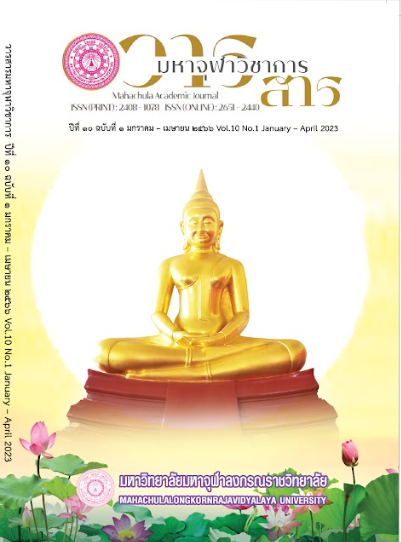A Buddhist Integrative Model to Enhance The Duty Performance of Provincial Good Governance Committees
Main Article Content
Abstract
This dissertation on “A Buddhist Integrative Model to Enhance the Duty Performance of Provincial Good Governance Committees” has three objectives: (1) examined the principles, concepts, theories, good governance, and the performance of duties of the provincial governance Committees; (2) studied the role of the provincial governance committees, and (3) presented the template of the Buddhist integrative role of the provincial governance committees.
The research has found that the good governance concepts arise during the age of globalization, receiving the widespread recognition leading to the creation and design of provincial governance committees that have two important roles: (1) monitoring how government agencies and government officials work, and (2) advising the guidelines to government agencies and government officials. The principles of Buddhism falling under three frameworks are: 1) Self-control which focuses on an individual having a set of the morals and creation of the Hiriotuppa in mind; 2) Control of people in the four Sangahavattha principles and the four Brahmawihan Dharma principles which work to create the unity in work; and 3) Control of work which is the result of the personal development and people development which follows the four components of Rddhippada.
The structure of the work of provincial governance committees integrating the Buddhist principles called “The Four Musketeer of Sustainable Work Processes” which is: The First Musketeer: the devotion is the self-control. This refers to the basic way of working. The Second Musketeer: the promotion is the people management. This plays a role in winning the hearts of co-workers and stakeholders to encourage the creativity and create the unity. The Third Musketeer : the support is the people management. It refers to the support of operating the work with love and the best intention to reach the goal of creating the benefit to the public. The fourth Musketeer: the public good is the work management which is considered the achievement from is the devotion/selflessness, promotion and support. The public good is the highest benefit that must be worked towards for the provincial governance committees
Article Details

This work is licensed under a Creative Commons Attribution-NonCommercial-NoDerivatives 4.0 International License.
References
ปิ่นมณี ขวัญเมือง. “อิทธิบาท ๔ : เส้นทางสู่ความสำเร็จ”. วารสารคุรุศาสตร์อุตสาหกรรม. ปีที่ ๑๓ ฉบับที่ ๓ (กันยายน - ธันวาคม ๒๕๕๗).
ผดุง วรรณทอง. อนันต์ ธรรมชาลัย และ สานิต ศิริวิศิษฐ์กุล. “การประยุกต์ใช้หลักอิทธิบาท ๔ ในการบริหารองค์เอกชนในจังหวัดนนทบุรี”. วารสาร มจร สังคมศาสตร์ปริทรรศน์. ปีที่ ๗ ฉบับที่ ๒ (เมษายน - มิถุนายน ๒๕๖๑) : ๘๙ - ๙๙.
พระเทพโสภณ (ประยูร ธมฺมจิตฺโต) และ เสฐียรพงษ์ วรรณปก. มณีแห่งปัญญา. กรุงเทพมหานคร: สำนักพิมพ์ธรรมสภา, ๒๕๔๖.
พระพรหมคุณาภรณ์ (ป.อ. ปยุตฺโต). พจนานุกรมพุทธศาสน์ ฉบับประมวลธรรม. กรุงเทพมหานคร: สำนักพิมพ์ผลิธัมม์, ๒๕๔๖.
มหาวิทยาลัยมหาจุฬาลงกรณราชวิทยาลัย. พระไตรปิฎกภาษาไทย. ฉบับมหาจุฬาลงกรณราชวิทยาลัย. กรุงเทพมหานคร: โรงพิมพ์มหาจุฬาลงกรณราชวิทยาลัย, ๒๕๓๙.
มุตาพร บริบูรณ์ลาภผลิน และ สุวิญ รักสัตย์. “การแก้ไขปัญหาอคติในสังคมไทยด้วยพุทธบูรณาการ”. วารสารวิชาการ คณะมนุษยศาสตร์และสังคมศาสตร์ มหาวิทยาลัยราชภัฏนครสวรรค์. ปีที่ ๖ ฉบับที่ ๒ (กรกฎาคม - ธันวาคม ๒๕๖๒).
ลิขิตา ฌลิมพลโยธิน, เฉลิมชัย กิตติศักดิ์นาวิน และ นลินณัฐ ดีสวัสดิ์. “ภาวะผู้นำกับการพัฒนาองค์การโดยใช้หลักพรหมวิหาร ๔”. วารสารวิชาการมหาวิทยาลัยธนบุรี. ปีที่ ๑๑ ฉบับที่ ๒๖ (กันยายน - ธันวาคม ๒๕๖๐).
วนิดา ชุมนุม. “ธรรมาภิบาลแนวพุทธ : กรณีศึกษาองค์กรปกครองส่วนท้องถิ่นในประเทศไทย”. วารสารเทคโนโลยีภาคใต้. ปีที่ ๑๑ ฉบับที่ ๒ (กรกฎาคม – ธันวาคม ๒๕๖๑).
สงุ่น ตรีสุขี. “บูรณาการหลักสังคหวัตถุ ๔ กับการบริหารการประปานครหลวง”. วิทยานิพนธ์ พุทธศาสตรดุษฎีบัณฑิต สาขาวิชาพระพุทธศาสนา. บัณฑิตวิทยาลัย: มหาวิทยาลัยมหาจุฬาลกรณราชวิทยาลัย, ๒๕๕๘.
สัมฤทธิ์ กางเพ็ง. ภาวะผู้นำเชิงพุทธ. มหาสารคาม: หลักสูตรพุทธศาสตรมหาบัณฑิต สาขาวิชาบริหารการศึกษา คณะครุศาสตร์ มหาวิทยาลัยมหาจุฬาลงกรณราชวิทยาลัย, ๒๕๖๐.
สมเด็จพระญาณสังวร สมเด็จพระสังฆราช (เจริญ สุวฑฺฒโน). รวมธรรมะ. กรุงเทพมหานคร: บริษัทอมรินทร์พริ้นติ้งแอนด์พับลิชชิ่งจํากัดมหาชน, ๒๕๔๓.
ชล บุนนาค. “Effective governance: แนวคิดเกี่ยวกับหลักการบริหารจัดการเพื่อการพัฒนาที่ยั่งยืน”. [ออนไลน์} แหล่งที่มา: https://www.sdgmove.com/ [๑๘ มิถุนายน ๒๕๖๔].
คณะกรรมการบริหารราชการแผ่นดิน สภานิติบัญญัติแห่งชาติ สำนักกรรมาธิการ ๒ สำนักงานเลขาธิการวุฒิสภา. “รายงานผลการพิจารณาศึกษา เรื่อง คณะกรรมการธรรมาภิบาลจังหวัด (ก.ธ.จ.)”.[ออนไลน์] แหล่งที่มา : https://www.senate.go.th/[๓ ตุลาคม ๒๕๖๔].
รัฐธรรมนูญแห่งราชอาณาจักรไทย (พ.ศ. ๒๕๕๐). [ออนไลน์]. แหล่งที่มา: https:// www.ombudsman.go.th/ [๗ กุมภาพันธ์ ๒๕๖๔].
รัฐธรรมนูญแห่งราชอาณาจักรไทย พุทธศักราช ๒๕๖๐. [ออนไลน์]. แหล่งที่มา : http://www.ratchakitcha.soc.go.th/ (๒ ตุลาคม ๒๕๖๔).
สมบูรณ์ สิริประชัย. “ประวัติความเป็นมาของคำว่า “ธรรมาภิบาล” และพัฒนาการธรรมาภิบาลภายใต้กระแสโลกาภิวัตน์: นัยต่อประเทศไทย”. [ออนไลน์]. แหล่งที่มา: http://midnightuniv.tumrai.com/ (๑๙ มิถุนายน ๒๕๖๔).
ราชกิจจานุเบกษา เล่มที่ ๑๑๖ ตอนที่ ๖๓ ง ๑๐ สิงหาคม ๒๕๔๒. ระเบียบสำนักนายกรัฐมนตรีว่าด้วยการสร้างระบบบริหารกิจการบ้านเมืองและสังคมที่ดี. [ออนไลน์]. แหล่งที่มา: http://www.dmr.go.th/ (๑๙ มิถุนายน ๒๕๖๔).


